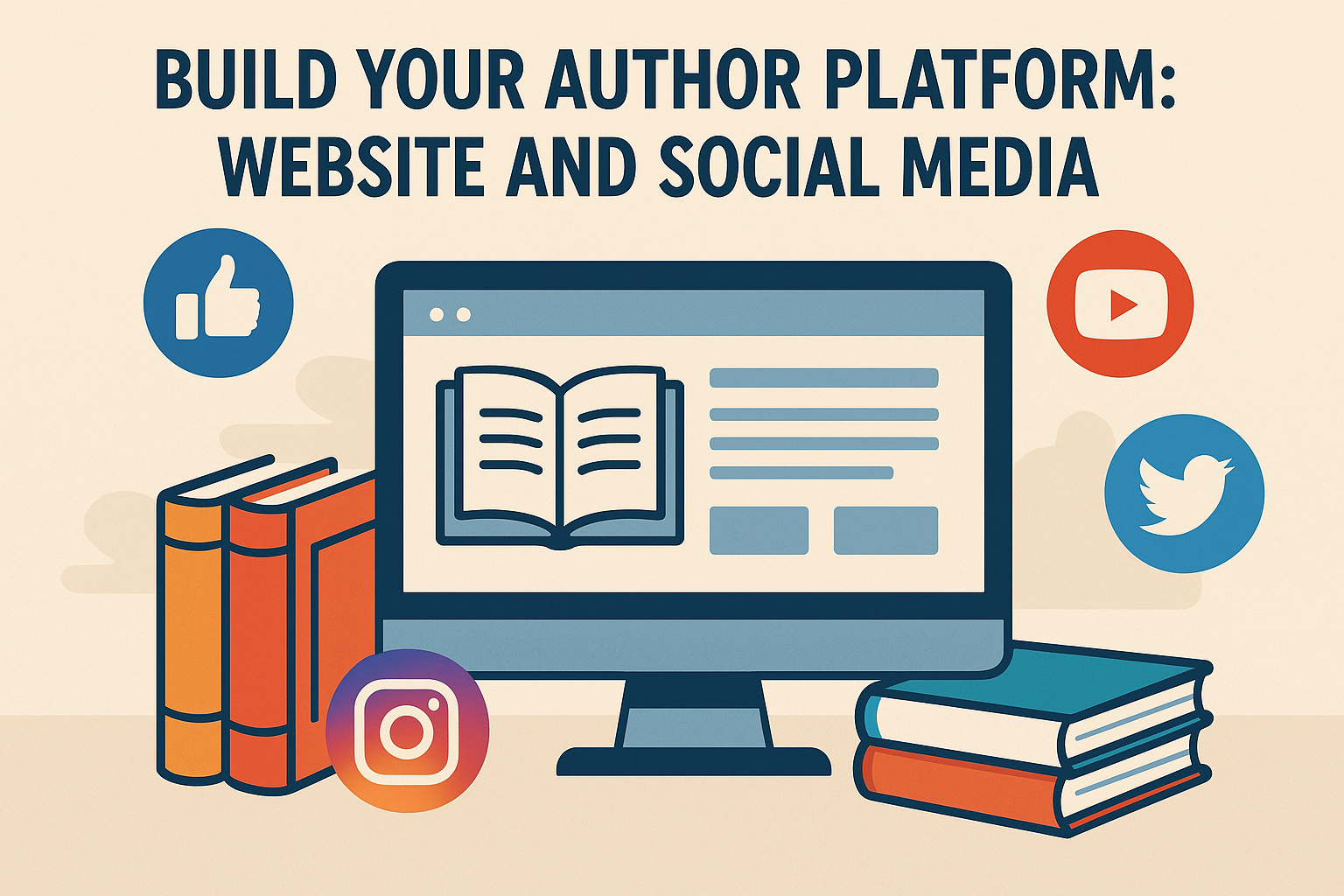If you’re an author looking to grow your audience, boost your credibility, and get noticed by publishers, building your author platform is a crucial first step. A professional author website and strategic use of social media are two of the most powerful tools in your marketing arsenal. In this guide, we’ll walk you through how to create an author website, build your online presence, and connect with readers. Whether you’re just starting or ready to publish, your platform can be the difference between staying invisible and getting published.
Your Website Is Your Digital Home
Why It’s Important
It facilitates your professional image.
Your website serves as your home base for your online presence and it is yours to keep, unlike social media. A well designed website can showcase your personality as an author, which will impact how your audience views you.
First impressions matter! Visitors to your website will often form opinions about your work based on multiple aspects of your website. What does the branding look like? How well does the website function? These are some questions to consider when crafting your website.
Don’t shy away from your brand. Your website is your opportunity to put your best foot forward and say “This is me!” to the world. This will help you create authentic connection with your audience.
Your Website Is Your Information Hub
It serves as a central HQ for all the books and content you have to offer.
What should you include in your website?
- Your bio and photo.
- Your book’s information (a gallery, if multiple books) with pre-order links.
- Blog/news section (This offers you an easy way to update everyone on your events/signings/book updates.)
- Contact information – don’t miss any opportunities to connect!
- Links to your social media profiles.
- Email newsletter sign up form.*
You Can Make Direct Sales On Your Personal Website
Having an online store can lead to increased sales and a chance to create merchandise for your biggest fans to support your authorship. How many popular books have merch that go along with it? A lot, and you can do it too!
Consider having exclusive offers on your website only. If a reader wants to have a signed copy of your book, create a listing that highlights it as a signed copy. The same goes for limited editions if you’d like to carry items such as sprayed edges. This not only generates additional revenue, but can help strengthen your brand identity.
If you consider having an online store, know that this can enhance your profit margins and provide a more personalized experience and deeper connection with your audience.
Your Website Creates Opportunities
A website enhances your brand and online visibility, making it easier for people to find you.
Consider brushing up on SEO, search engine optimization. This means using relevant keywords in the content on your website to improve your rankings on search engines. Keywords can include your genre, book themes, and writing style.
An attractive website can bring in opportunities for you as an author. Imagine a podcast reaching out just from looking at your website! Other things can include businesses, speaking engagements, or collaborations with other authors. The possibilities are endless.
How to Build Your Author Website (in 5 Simple Steps)
A strong website is the foundation of your author platform. Whether you’re just starting out or already published, here’s a simple roadmap to get your website up and running without needing to hire a web designer.
1. Choose the Right Platform
Pick a website builder that fits your comfort level:
-
Beginner-friendly: Squarespace, Wix
-
More flexible: WordPress (best if you want to scale or blog frequently)
These platforms offer beautiful templates you can customize without needing to code.
2. Secure Your Domain Name
Choose a professional domain name like:
YourNameAuthor.com
Use domain providers like GoDaddy or Google Domains to register it. Keep it short, memorable, and easy to spell.
3. Build These Core Pages
Your website should include:
-
Homepage: Introduce yourself with a strong author tagline and photo.
-
About/Bio Page: Tell your story—keep it personal and professional.
-
Books Page: Show off your published or upcoming work with covers, descriptions, and purchase links.
-
Contact Page: Add a simple form or email so readers and media can reach you.
-
(Optional) Blog or News Page: Share updates, behind-the-scenes stories, or writing advice.
4. Grow Your Email List
Add a signup form for a newsletter. Offer a free chapter, bonus content, or updates to encourage readers to subscribe. Tools like Mailchimp or ConvertKit integrate easily with most website platforms.
5. Launch and Share
Once your site is live, share the link:
-
Add it to your social media bios
-
Include it in your email signature
-
Use it in your author submissions and press materials
Pro Tip: Keep your branding consistent—use the same author photo, colors, and voice across your site and social channels.
Expanding Your Reach With Social Media
Why Is It Important
Social media platforms are a great way to connect with future readers, other authors, and industry pros in a more casual and interactive way.
Audience Discovery
With advanced algorithms, like those used by Instagram or TikTok, there are endless possibilities to find your target audience.
A good #hashtag strategy can increase the reach of your posts. Consider using genre and theme specific hashtags like #Memoir #FantasyBooks or #RomanceReads to push your content to those looking at specific topics.
Platforms like Instagram and TikTok offer analytics that show which posts perform the best. Using this data to refine your posting strategy and focus on the content your audience resonates with the most can help grow your platform best.
Community Building
This is how authors can interact directly with their readers, fostering a close-knit community.
Consider using Q&A sessions, polls, and live chats to interact with your audience. Direct communication will aid you in creating a personal connection with your readers and encourage them to remain a fan.
Within your community, you can leverage your top readers to share their thoughts and reviews on their personal platform. This not only gets you valuable feedback on your work, but continues to push your book and brand with the world!
Content Sharing
Social media can allow you to share a diverse range of content.
Sharing glimpses of your writing process or research tips encourage transparency and can make readers feel like they are a part of your book writing journey.
Sharing your personal experiences on social media can also have your audience connecting with you on a human level. The more personal things feel, the more intrigue you can bring to your content.
What can you share? Behind the scenes content, mood boards related to your book, what writing looks like for you, and what to expect out of your book are all popular topics!
Networking
Networking as an author is integral in every stage as an author!
You have the opportunity to not only interact with your readers, but other authors and industry professionals in the book world.
Collaborating with other authors can expand your reach and introduce you to new audiences. Following and interacting with those in the industry can help you to stay informed on current trends and meet others to push your career forward.
What Are Some Tips For Being Effective On Social Media?
- Choose 1 or 2 platforms of which you are comfortable using.
- Instagram and TikTok are most popular for fiction writers.
- Facebook and LinkedIn are popular platforms for nonfiction writers.
- These are just guides – you can find success on whichever platforms you are most comfortable with and can be active on the most.
- Maintain a consistent posting schedule:
- This can be once a week while you learn the ins and outs, but don’t leave your audience guessing on when you’ll post next!
- Engagement is key!
- Engaging with your followers with comments and messages lets them know you are there for them.
- Share non-promotional content! Promoting with every post can come across as scammy and your audience will likely not want to engage.
- Use relevant hashtags to increase discoverability.
- Consider making a custom hashtag that your followers can use when they talk or post about your book. This helps with visibility.
As you prepare to launch, remember that effective book marketing begins long before your book is out in the world. Building that robust author platform can provide you with support, shared knowledge, and cross-promotional opportunities to help you navigate your launch with a sense of confidence.
Social Media for Authors: Where to Start and What to Share
Social media is a powerful way to connect directly with readers, grow your audience, and promote your books without feeling sales-y. Here’s how to make it work for you—without spending all day online.
1. Choose the Right Platforms
You don’t need to be everywhere. Focus on 1–2 platforms where your readers already spend time:
-
Instagram: Great for visual storytelling, behind-the-scenes writing life, book photos
-
Facebook: Best for community building and event promotion
-
TikTok (BookTok): Growing fast for authors, especially in fiction and YA
-
LinkedIn: Ideal for nonfiction authors, business books, and thought leadership
-
Twitter/X: Best for quick updates and networking with other writers
Choose what fits your personality and writing goals.
2. Optimize Your Author Bio
Each platform should clearly say:
-
Who you are (genre helps!)
-
What you write
-
A call to action (link to your website or book)
Use a free tool like Linktree or Beacon to connect followers to your book, newsletter, and site from one link.
3. What to Share
Not sure what to post? Here’s a content mix that builds engagement and trust:
| Type of Post | Examples |
|---|---|
| Book-related | Cover reveals, quotes, Amazon links |
| Writing journey | Writing updates, drafting progress |
| Behind-the-scenes | Workspace tour, favorite writing tools |
| Engagement prompts | “What’s your favorite book?” polls |
| Milestones | Book deals, reviews, launch announcements |
You don’t need to go viral—just show up consistently and authentically.
4. Use Hashtags Wisely
Hashtags help readers find your content. Try:
-
#AmWriting
-
#BookLover
-
#IndieAuthor
-
#WritingCommunity
-
#BookRecommendation Use 5–10 relevant hashtags per post depending on the platform.
5. Stay Consistent (Without Burnout)
You don’t have to post every day. Set a goal that’s realistic:
Pro Tip: Treat social media as a conversation, not just a sales tool. Ask questions, reply to comments, and be human.
Ready to Share Your Story?
If you’re an author ready to take the next step, we’re here to help. Submit your manuscript and let Indigo River Publishing bring your book to life.





